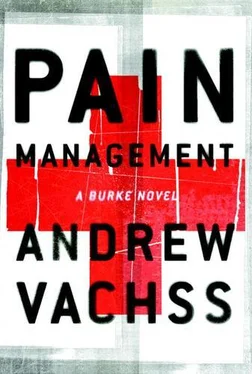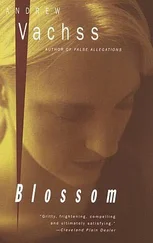“At least two ghosts, then,” Oz said. “Vestry made it to the hospital in time; the other guy didn’t. But there were two shots.”
“So—not a zip,” the Prof said, thoughtfully. “Ain’t no way to reload one of those suckers that fast.”
“Or two zips. And two shooters,” Darryl said.
Everyone went quiet for a while. Then the Prof said, “I think Schoolboy nailed it the first time.”
We all looked at him.
“It was a ghost,” the little man said. “And we all know his name.”
The Prof was on the money. So, by the time Vestry came up to me on the yard—alone, with his hands held away from his body—to ask his question, I had the answer ready.
“Five hundred dollars?” he said, stunned. He patted the yellowing tape around his neck that held the stitches in place, as if that would make his ears work better.
“Soft money,” I told him. “No smokes, no trades, no favors. Folding cash.”
“There ain’t that much soft in this whole—”
“You got chapters on the bricks,” I said quietly. “Take up a collection.”
I guess they raised the money. When they racked the bars for the morning count a couple of weeks later, Jester didn’t move. Died in his sleep, word was. Maybe something he ate.
“I already paid half,” Vestry said the next day. “In front. How do I know he did that spic? I heard the docs don’t know what killed him.”
“You know who you’re dealing with,” I told him. “You don’t come up with the other half, that’s what they’ll be saying about you.”
The prison library was always full of guys working on their own appeals. And jailhouse lawyers working for cigarettes, or dope, or the use of some wolf’s punk. It was the DMZ, neutral turf, off-limits for violence. Any problems there, the Man would be only too happy to close it down. So it stayed peaceful.
I spent a lot of time there, reading with my thick little pocketbook-sized dictionary next to me. You could make steady scores writing letters for guys, especially to pen-pal women they were trying to pull. I was known to be pretty good at it, even as young as I was.
I never saw him coming. Nobody ever did. One minute I was all alone. The next it was as if a cold wind had blown past, and then Wesley was sitting beside me.
“They paid,” is all he said.
And then he was gone.
I was cut loose before Wesley was. I went back to thieving. When Wesley got out, he went back to what he did.
One time, they didn’t pay him.
Wesley settled accounts with them all, and then he was gone again.
Dead and gone, people said.
But the whisper-stream still vibrated at the sound of his name. Odds on dead? Pretty good. On gone? No takers.
Homicides still happened. And when they happened to certain people, in certain ways, when no one ever got popped for them . . .
I wondered what they whispered about me now. I’d been dead and gone myself for a couple of years. Gunned down in the abandoned flatlands of Hunts Point, dumped in front of the ER unconscious, in a coma for . . . a long time. When I’d finally come around, the cops were there. My prints had marked me. They knew who I was. Only problem was, I didn’t know who I was.
One of the bullets had scored my brain when I took one in the head—the one that broke the binocular connection between my eyes—and my memory was gone. I kept telling them that, anyway.
I’ll never know if they believed me. Whether they thought I’d finally escaped that hospital, or had just wandered off in a brain-damaged sleepwalk one night.
Later on, a Russian gangster got himself blown away right in his own restaurant. Maybe the police knew something then, provided they knew he was the same guy who’d hired me to middleman a swap: a bag of cash for a kidnapped kid.
The swap had turned out to be an ambush. The only thing exchanged was gunfire. I took some of it. My partner Pansy took the rest of it. Died with our enemy’s blood in her mouth.
As soon as I got myself into good enough shape to get around, I met Dmitri in his restaurant. I told him I needed the names of the people who’d hired him. He told me that would be bad for business. Took a professional’s stance—he’d been paid; he did a job. Had no idea the whole thing was a hit. He was sorry about it; but, after all, I’d survived, so what was the beef?
“They killed my dog,” I told him.
“Your . . . dog ?” he said.
I didn’t—couldn’t—try to explain Pansy to him. Just told him I was ready to kill him, right then and there, if he didn’t give me the names. He told me I was bluffing. His last words.
But, considering the power struggle going on in that section of Little Odessa back then, the cops could never be sure.
Even later, they found a severed hand at the bottom of a Dumpster. Just the bones, actually, not the flesh. And, in the same place, a pistol with my thumbprint on it. That was enough for the cops. They figured my string had run out and I’d ended up the same place I’d started from.
By that time, I was on the move. Somebody had wanted me dead. Went to a lot of trouble, spent a lot of coin. Maybe they thought they’d gotten the job done, maybe not. I only had two choices: hide or hunt.
If it hadn’t been for what they’d done to Pansy, I might have stayed invisible.
When the hunt was finished, so was I. Even Mama wasn’t pressing me to come back . . . not for a while. My face wasn’t the same—bullets and the surgery it takes to save you from them will do that—but my prints were.
Maybe NYPD bought the severed-hand story. They should—it was one of their own who had pulled my thumbprint from inside Mama’s, transferred it to the pistol. But that didn’t matter, really. I wasn’t a fugitive. My people checked. No wants, no warrants, no BOLOs, federal or state.
Probably safe to go back, they told me. But maybe better to stay where I was for a while. Rest and rebuild.
Sure.
Oregon’s a good place to hide. People don’t expect you to be born local. None of that “You ain’t from around here” stuff you get in some other places.
In Oregon, they bitch about the California money vamping north and buying up all the good real estate, but they come all over themselves when they think about how much their houses are worth now. They correct you when you pronounce their state “Are-a-gon.” They want you to say “Origun,” or something like that. But the city—Portland—is just like New York. Or Chicago, or L.A., or Atlanta. It rains a little more . . . although they have a lot more weather reports than they have weather. The people are a touch more polite, the buildings don’t climb quite as high. There’s plenty of traffic, but a whole lot less rage in the drivers.
Still, they got gangbangers, dope fiends, skinheads, homeless, hookers, and hustlers right alongside all the upscale restaurants and cultural opportunities. And probably more strip joints per square mile than any place outside of Bangkok.
The city even has outer boroughs. Vancouver is to Portland what Brooklyn is to Manhattan—even has a bridge you have to cross to get there. And they feature plenty of those licensed-to-steal “title loan” shops.
South of Portland, the coastline is an ever-shifting blend of retirees from other states and tourists rolling through in waves of RVs.
Eastern Oregon has a lot of mountains, a lot of small towns. A lot of pots brewing, from Christian Identity to crank.
Disappearing is easy. Connecting is what’s hard.
Gem’s key clacked in the front door’s heavy deadbolt. I didn’t move from where I’d been sitting, staring out the top-floor back window at a thin slice of empty sky.
Читать дальше











